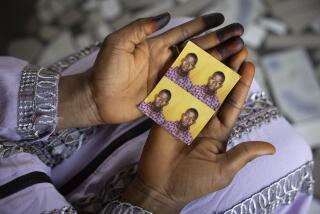Italy Convicts 4 Linked to Al Qaeda
- Share via
MILAN, Italy — An Italian judge convicted four Tunisian immigrants of criminal association Friday, including one identified as a key operative for the Al Qaeda terrorist network in Europe, and sent them to prison for up to five years.
They were the first post-Sept. 11 sentences handed down to any of the dozens of Muslim men who stand accused in several European countries of collaborating with Osama bin Laden’s network.
But Italian legal peculiarities lightened the punishment. At the time of the arrests last April and October, Italy lacked an anti-terrorism law for use against militants of foreign-based groups and resorted instead to a conspiracy charge that had been designed to catch Mafiosi. Also, the Tunisians were able to opt for a “fast-track” trial with reduced penalties.
The closed two-day trial and terse verdict produced no visible drama and shed little light on either the defendants or their life in an Islamic underground that came under intense police pressure after the terror attacks on the United States.
Clad in Western-style clothes, Essid Sami ben Khemais, the purported Al Qaeda logistics man code-named Saber, and his compatriots listened impassively to Judge Giovanna Verga’s verdict, then were handcuffed and led back to jail, defense lawyers said.
All four were convicted of selling false passports and identity cards for $500 per set to young men headed for Al Qaeda camps in Afghanistan, of organizing illegal immigration into Italy and of associating with criminal intent to obtain and transport arms, explosives and chemicals.
Defense lawyers had asked for an expedited trial, which in Italy allows for a limited amount of evidence to be introduced during a closed hearing and for a prison sentence reduced by about one-third if a defendant is convicted.
Then the judge knocked a year off the sentence the prosecution had sought for Ben Khemais, in part because he and the other defendants weren’t found in possession of weapons.
Ben Khemais and Bouchoucha Mokhtar were sentenced to five years each. Belgacem Mohammed ben Aouaid and Charaabi Tarek received four-year sentences.
Defense lawyers said they would appeal the convictions.
According to Italian investigators, Ben Khemais, 33, moved to Italy in 1998 after two years of terrorist training in Afghanistan. The investigators believe that Al Qaeda sent him to supervise terrorist operations in Europe. Spanish police suspect that he may have met Mohamed Atta, a suspected mastermind of the Sept. 11 attacks, early last year in Spain.
Ben Khemais and two co-defendants were arrested April 5 in a raid on his apartment near Malpensa airport north of Milan. Italian officials say the apartment housed a terrorist cell loosely connected to similar operations in Germany, Spain, Britain, France and Belgium that sent Muslim recruits to train in Afghanistan, who then return to Europe ready to strike Western targets at Al Qaeda’s behest.
None of the defendants convicted Friday was accused of being involved in the Sept. 11 attacks.
But police offered a 300-page report alleging a conspiracy to obtain or make weapons and use them to terrorize Europe. The report was based on transcripts from four months of wiretaps and bugged conversations between Ben Khemais’ apartment and Al Qaeda suspects in the German cities of Munich and Frankfurt, in Brussels and elsewhere.
The transcripts are filled with talk of the logistics of procuring and selling fake passports, identity cards, driver’s licenses and other documents. In one conversation, the men discussed putting poison gas in cans of tomatoes. In others, they discussed chemicals for making bombs.
Milan prosecutor Stefano Dambruoso, who brought charges against the defendants, called Friday’s verdict “the first to recognize the existence on European territory of a cell that had strong links with a base in Afghanistan.”
The defense disputed that claim.
In court, the defendants claimed to be guilty of nothing more than trafficking in false documents, and only for money to survive. Recalling that police first stopped him as he siphoned diesel fuel from a truck, Ben Khemais asked the judge, “How can a terrorist be reduced to that?”
“I am a practicing Muslim, not a terrorist,” he was quoted as saying.
“This is not a criminal association, just a group of young men,” defense attorney Antonio Nebuloni said he told the court. The state’s case, he argued, was based entirely on wiretapped conversations full of the loose talk one could hear in Europe “in the home of any non-European immigrant without a steady job--that the West is disgusting, that we should burn everyone.”
“That doesn’t make them terrorists,” he added. “Terrorists have arms, cyanide, bombs.” The police “couldn’t find those weapons, so it accused them of ‘terrorism with documents.’ ”
Dambruoso, the prosecutor, told the court that people who provide false documents to terrorists are just as dangerous as terrorists carrying arms.
Under Italian law, Judge Verga has 90 days to spell out reasons for her verdict.
Since October, Italy has adopted an anti-terrorism law mandating stiffer sentences than the ones given Friday. But Dambruoso said he was satisfied that an anti-terrorist climate in Italy had prompted a more severe punishment than would have been the case before Sept. 11.
Three other Tunisians allegedly belonging to the Milan cell went on trial separately here Monday on the same charge of criminal association.
Similar cases, based on overlapping investigations into scattered Al Qaeda-linked cells, are headed for trial in several European countries.
In Germany, prosecutors have charged a Moroccan as an accomplice of the Hamburg cell that allegedly carried out the Sept. 11 hijackings. In Spain, eight men are accused of being accomplices of the hijackers and a hub of recruitment, finance, fake documents and shelter for Al Qaeda operatives.
Authorities in France, Britain and Belgium have opened cases against a Tunisian-led network accused of aiding two Brussels-based suicide bombers who assassinated Ahmed Shah Masoud, an anti-Taliban guerrilla leader, in Afghanistan on Sept. 9. Suspects in half a dozen countries await trial for aborted plots to bomb the U.S. Embassy in Paris and stage a chemical gas attack in Strasbourg, France.
*
Times staff writer Sebastian Rotella in Paris contributed to this report.
More to Read
Sign up for Essential California
The most important California stories and recommendations in your inbox every morning.
You may occasionally receive promotional content from the Los Angeles Times.










